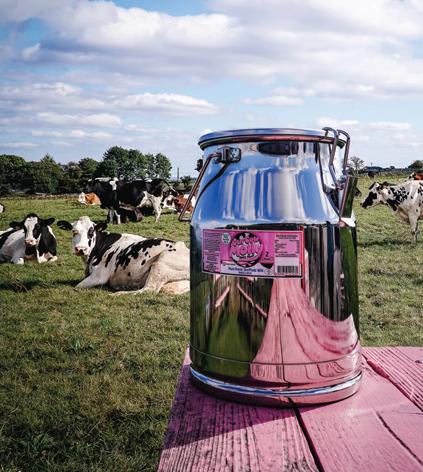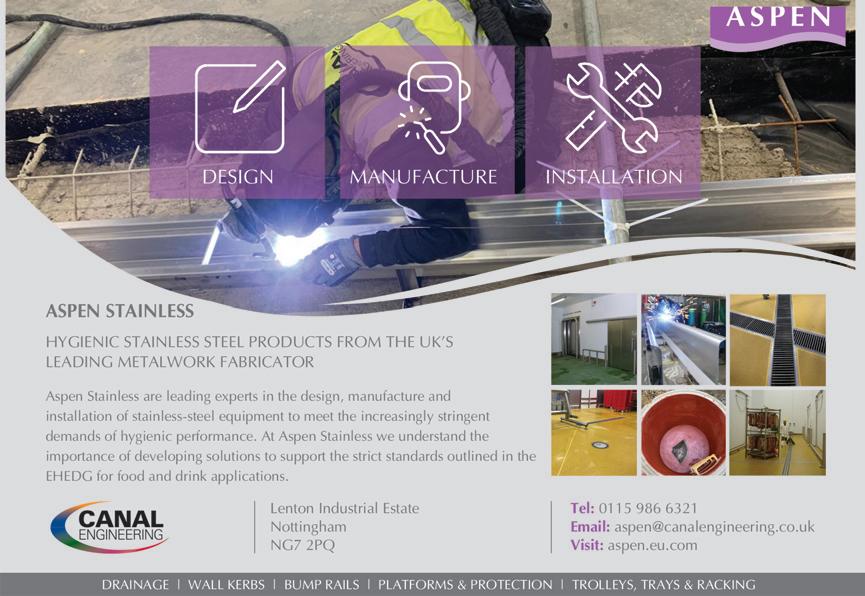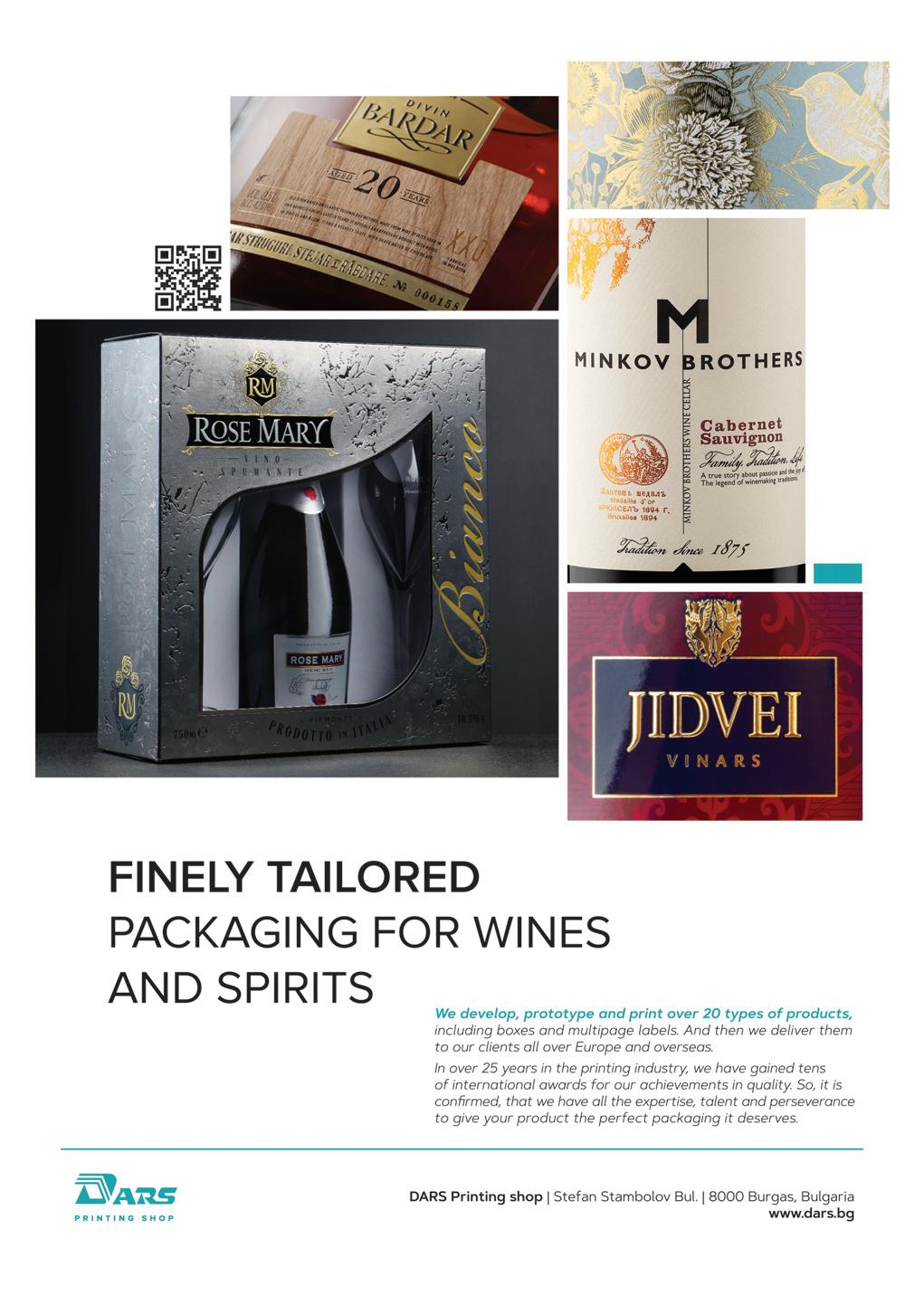
12 minute read
Educating on best sustainability practices throughout the food and drink industry
Inside Food & Drink interviews Rachael Rothman, Professor of Sustainable Chemical Engineering at the University of Sheffield.
Educating on best SUSTAINABILITY PRACTICES
Advertisement
throughout the food and drink industry
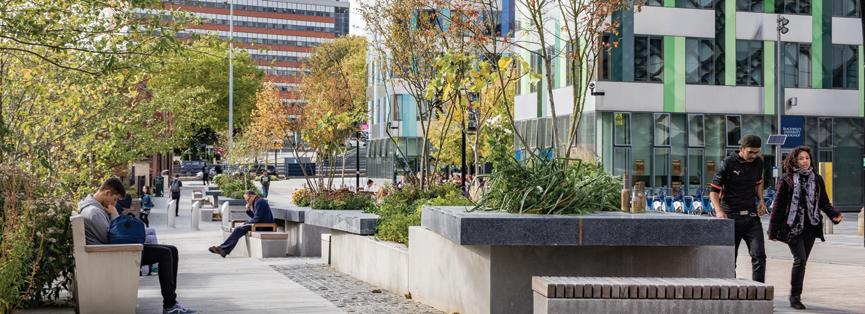
Rachael Rothman has devoted her career to sustainability at the University of Sheffield. As a Professor of Sustainable Chemical Engineering, Associate Director at Grantham Centre for Sustainable Futures, and Academic Lead for Sustainability, she outlines the work being done between academia and business to ensure companies maximise their sustainability impact, today, tomorrow and in the years to come. Daniel Barnes asked the questions.
Rachael, please tell us about your background and your role as the Academic Lead for Sustainability at the University of Sheffield.
I am a chemical engineer who grew up in Teesside, studied in Cambridge then came to Sheffield (via Sweden) and have been here almost 20 years. I love running and exploring the outdoors so being so close to the Peak District but in a thriving city is perfect. We now have two boys who keep us busy and inspire me to use my skills and knowledge to protect our environment and help us live more sustainably.
I started my research career looking at low carbon hydrogen production then moved into carbon dioxide utilisation. Both of these areas required detailed technical knowledge of the relevant processes, but also an ability to look at a whole system to evaluate potential impacts and benefits. Gradually I moved more into systems level analysis of processes and sustainability and a few years ago started applying this to plastics as well as the broader energy picture.
As University Academic Lead for Sustainability I lead our university’s sustainability work, including the development of our five year sustainability strategy which we launched in November 2020. The strategy was co-created with staff and students from across the university and outlines our thinking around sustainability (for example, that there is always a balance between different factors and that environmental, economic and social sustainability are important).
The strategy includes targets across our campus, teaching and research. We aim to be net zero for scope 1 and 2 emissions (those related to electricity and heating and those that we are directly responsible for e.g. fleet vehicles) by 2030 and for all other emissions by 2038. The strategy is accompanied by an action plan which is continuously evolving and updated to help us meet our targets.
The food and waste sections of our strategy commit to reducing sale of high impact food, investigating local and on campus food growing and reducing single-use packaging and waste. We have already completed several ‘living labs’ projects where academics, students and professional services staff work together to provide the evidence base for making more sustainable decisions, and then implement change on campus. Our move to milk churns (from plastic bottles) is a great example of this.

I am also the Director of the new South Yorkshire Sustainability Centre which will bring together academics, local authorities, businesses, industry and the third sector to drive forward sustainability through knowledge exchange (KE) and co-design of solutions to regional and global sustainability challenges. The centre is support by £5 million funding from Research England and is just getting started. We have exciting projects, including on decarbonising industry, retrofit and urban agriculture, so watch this space for future updates.
And speaking in greater detail of the move to milk churns, last year you co-authored a paper titled: Reimagining the milk supply chain: Reusable vessels for bulk delivery involving LCA data. The focus for this study was a supply chain from one farm to 10 cafes at the university. How easy would it be for businesses with larger supply chains to scale-up and apply your methodology to achieve their own sustainability goals?
In the paper we carried out the life cycle assessment to analyse if reusable stainless steel milk churns would be better environmentally than single use plastic milk bottles. The 10 university cafes considered use a staggering 87,000 plastic milk bottles a year between them. The analysis showed a 65% reduction in carbon footprint was possible by moving to reusable churns, with reusable glass bottles used for small volumes of milk.
The dairy that supplies the university with milk is only four miles away. This is an advantage when considering the reverse logistics of returning empty churns and bottles for washing and reuse. We recently won some further funding to install a churn washer at the farm which will minimise water use and make the washing and other reverse logistics more efficient.
Any business could in theory switch to reusable vessels, but there are a few things to bear in mind: firstly, the shorter the transport distance for reverse logistics the better, and secondly, the vessels need to be used enough times that the carbon footprint and other impacts are lower than single use alternatives.
In the case of the milk churns they are part of a captive system –the dairy collects the churns from the café and none are lost from the system. It is always worth doing the LCA to check that reuse makes sense for any given situation, or if the distribution distances need to be shorter or the reusable vessels used more times with a higher return rate.
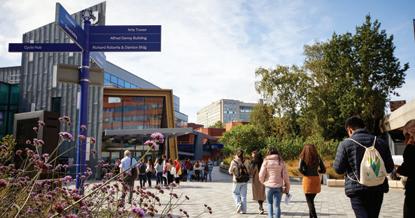
The Grantham Centre for Sustainable Futures is part of the University of Sheffield. How does the work of the Grantham Scholars drive sustainability in the UK?
The Grantham Centre has two main streams of activity: training and supporting our Grantham scholars and coordinating and delivering large interdisciplinary research projects with a sustainability focus.
We have over 50 Grantham scholars currently, working on projects ranging from sustainable housing to the risk and impact of forest fire on biodiversity and carbon emissions in Nepal, and design of algae-bacteria scrubbers for combustion gases to health interventions to regulate sugary beverages in Trinidad and Tobago.
Whilst projects are based all around the world, they also have impacts in our local region and results are very translatable to the UK. For example, one of the Grantham Scholars is investigating the use of green barriers to mitigate air pollution in school playgrounds. She led development of a green barrier at a primary school in Sheffield which dramatically reduces levels of NOx and particulates in the playground.
The Many Happy Returns project for the Grantham Centre is focused on the plastic pollution crisis. How will this project enable reusable packaging systems?
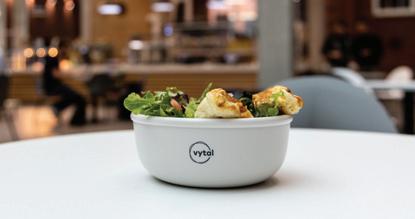
Inside Food & Drink interviews Rachael Rothman, Professor of Sustainable Chemical Engineering at the University of Sheffield.
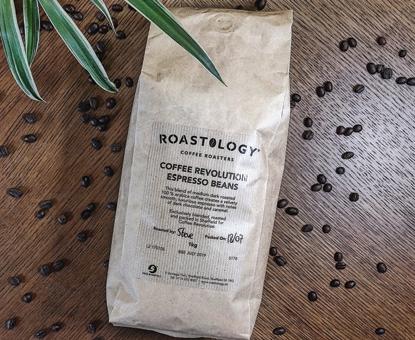

Many Happy Returns is a truly interdisciplinary research project that aims to make reuse mainstream. We are currently trialling a reusable cup and bowl scheme in five of our university cafes. If a customer chooses to take away, they can choose to have a reusable cup or bowl. The customer uses the Vytal app to scan the barcode on the lid and assuming the cup/bowl is returned within two weeks there is no additional cost.
We have conducted the full life cycle assessment to show the potential carbon savings of the scheme and are trialling different advertising options to see the best way to increase uptake of the scheme. Our engineers are looking at the durability of the bowls and our behavioural psychologists are looking at people’s likelihood of engaging with the scheme, particularly considering change in attitude if a bowl/cup is discoloured or scratched. Our linguists have looked at how people use language around plastics and have fascinating insights around people having good intentions but often following them with a ‘but’ of inconvenience.
It is by having all these different disciplines working together that we will be able to make concrete recommendations on deployment of reuse schemes.
One thread of the project is life cycle analysis (LCA). Can you please explain LCA for our readers and how this will impact sustainability?
A life cycle assessment analyses the environmental impacts of a process. This includes the carbon footprint, but also impacts such as land use, water consumption, resource depletion and ecotoxicity. Ideally LCA is carried out from cradle to grave. The power of an LCA is that it quantifies environmental impact. This doesn’t mean you can easily make a decision about what is ‘best’ – often when comparing two products, one will be better in some impact categories and the other will be better in other impact categories. It is also important to consider economic and social aspects of sustainability that aren’t included in an LCA. An LCA therefore gives part of the picture of sustainability, and should be considered alongside other factors.
Of relevance to the food and drink industry is that the impacts of littering of single use plastic packaging cannot currently be modelled due to a lack of relevant indicators, and the impacts of composting on the soil are also not included. LCA does however give a good indication of hotspots for a product or process. LCA is also powerful in ensuring any changes we might make don’t lead to unintended consequences that would be worse than the initial product.
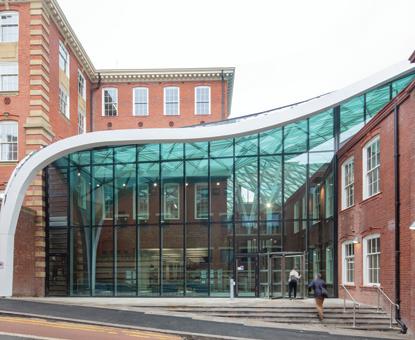
In January 2022, you spoke at UK Parliament’s Environment, Food and Rural Affairs (EFRA) Committee about the move towards zero ‘avoidable’ plastic waste. In the long-term, how can businesses achieve this goal? Conversely, are there any shorter-term steps that you’d recommend all companies could introduce to help reduce such waste?
The key really is to reduce, reuse, recycle. Have a look at the supply chains and assess where plastic can be cut out completely, or where existing plastic could be reused and therefore not become waste. Wherever possible choose plastic that can be mechanically recycled. It’s also important to look at where the plastic comes from – does it have recycled content in it?
It’s important not just to jump from plastic to an alternative material, without considering the change in environmental impacts and whether that material is actually needed at all. Quite often, alternative materials are heavier and involve greater transport emissions, so may not be better after all.
What do you see as the biggest sustainability challenges facing businesses in the UK?
Decarbonising heating is a big challenge. This includes both heating in buildings and industrial process heating. The two main choices are electrification (e.g. through heat pups) or hydrogen. The ‘best’ choice will be different in different situations, but to do either on a large scale we don’t currently have the infrastructure and will need investment over the coming years.

Decarbonising air travel is also difficult and from a sustainability perspective it is important to take advantage of the online meeting tools whose development has hugely accelerated due to the pandemic.
Another big challenge is understanding our supply chains and their carbon footprint (and other environmental impacts). We are used to accounting money and we need to start accounting carbon as well if we are to have any hope of reaching net zero in time.
Ensuring a just transition as we move to net zero is also a big sustainability challenge and it’s very important to remember that to be sustainable a product, process or system must be environmentally, economically and socially sustainable.
What role can – or has – academic research played in addressing these challenges? Are there any case studies you’d like to share?
There is a huge amount of academic research ongoing into lots of different aspects that will help us research net zero. I am part of the Hydrogen Research Challenge Coordinator project where we are bringing together industry, policy makers and academia to map out the research challenges that need to be addressed for large scale hydrogen deployment.
As part of the South Yorkshire Sustainability Centre I am leading some work looking at industrial decarbonisation using hydrogen. For example, we are working with a brick works to look at how they might replace their existing natural gas burning kilns with something more sustainable.
Colleagues are looking at sustainable aviation fuel, which can be produced from carbon dioxide captured from flue gases.
There’s lots of exciting research going on!
The University of Sheffield has a detailed Sustainability Strategy, with an emphasis on Education for Sustainable Development. How will this approach support sustainable business in the future?
The University of Sheffield has committed to embedding Education for Sustainable Development in all courses by 2025. There are three key ways we are doing this.
Firstly, from the 2022 academic year all first year students will learn about what sustainability means to us as a university and how they can live and learn sustainably on campus. Secondly, we have been working closely with our careers team to develop sustainable careers events and inclusion of sustainability in the MySkills portfolio that students complete, and thirdly, individual departments will be including more links to sustainability in the modules they teach. For example, I teach a second year chemical engineering design course in which students have design work based on production of nitric acid for fertiliser and use of carbon dioxide to produce synthetic fuel.
By educating our students about sustainable development, by leading by example in our campus, and by showcasing sustainable career opportunities, our graduates will be highly trained in skills relevant to sustainability and will be the sustainability leaders of the future, in business and elsewhere.
You have devoted a lot of your career to sustainability and to the University of Sheffield. On a personal level, what do you most enjoy about your work?
I love doing something that can make a difference to the world. I really enjoy working with teams of people, bringing different skills together so that the sum is much greater than the parts. I also really enjoy teaching students and explaining science and engineering to the public in an accessible way. The lightbulb moment people get when they suddenly understand something you have been explaining is very rewarding. n
